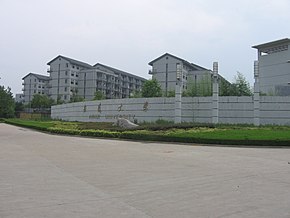Anhui University
安徽大学 | |||||||
Other names | 安大, āndà | ||||||
|---|---|---|---|---|---|---|---|
| Motto | 至诚至坚,博学笃行 honest, resolute, erudite, discreet | ||||||
| Established | 1928 | ||||||
| President | Sun Changyin (孙长银) | ||||||
Academic staff | 1,522 | ||||||
Administrative staff | 2,500 | ||||||
| Students | 26,690 | ||||||
| Undergraduates | 21,338 | ||||||
| Postgraduates | 5,352 | ||||||
| Location | , , China | ||||||
| Campus | 磬苑校区, 龙河校区 (2,143,116 m2 (214 ha; 530 acres) | ||||||
| Website | www | ||||||
| Chinese name | |||||||
| Simplified Chinese | 安徽大学 | ||||||
| Traditional Chinese | 安徽大學 | ||||||
| |||||||


Anhui University (AHU) is provincial public university in Hefei, Anhui, China. It is affiliated with the Anhui Provincial Government, and co-funded by the Anhui Provincial Government, the Ministry of Education, and SASTIND. The university is part of the Double First-Class Construction and Project 211.
The university currently has approximately 27,000 students and 2,500 staff including 1,522 faculty members. It consists of 14 colleges, Anhui University's broad-based education covers philosophy, economics, law, literature, history, science, engineering and management.
History
[edit]Anhui University was established in 1928 in Anqing and moved to Hefei in 1952 where it was split into Anhui Agricultural College and Anhui Normal University. In 1958 the Anhui provincial government rebuilt the university in Hefei. Anhui University is a higher education institution supported by the government under the State Double First Class University Plan and the former 211 Project.
Campus
[edit]The university has four campuses. The main campus covers an area of 55 hectares (140 acres), two branch campuses are 30 hectares (74 acres) and the new campus is about 200 hectares (490 acres). The university consists of 18 schools, 44 departments, 65 undergraduate programs, 119 master's degree programs, 16 Ph.D. programs, one post-doctorate scientific research work station, two state-level disciplines and 12 provincial-level disciplines. The university has a staff of 2399 including 210 professors and 490 associate professors. The student population totals 28143 including 6466 mature students.
Library
[edit]The university library has a collection of more than 1.75 million books and over 7000 Chinese and foreign periodicals. There are two libraries in both the main campus and the new campus.
Department structure
[edit]Anhui University consists of 18 schools, 44 departments, 65 undergraduate programs, 119 master's degree programs, 16 PhD programs, one post-doctorate research flow work station, four professional master's degree programs, two state-level disciplines and 12 provincial-level disciplines. The university has a staff of 2,399 consisting of 210 professors and 490 associate professors. The student population totals 28,143 including 6,466 mature students.[1]
Postdoctoral Research Station
[edit]- Computer Application and Technology
State Key Disciplines
[edit]- Chinese Language & Graphonomy
- Computer Application Technology
Provincial Key Disciplines
[edit]- Basic Mathematics and Probability Statistics
- Material Physics
- Inorganic Chemistry
- Circuit and Systems
- Foreign Philosophy
- Political Economics
- Economics Law
- Ancient Chinese Literature
- English Linguistics
- Theoretical Physics
- Computer Applications
- Magnetic and Microwave Technology
- Information Management and Information Systems
- Arts and Design
- Music
Research Institution for Human & Social Sciences under the Ministry of Education
[edit]- Huizhou Studies
Key labs under the Ministry of Education
[edit]- Intelligent Computing and Signal Processing
International exchange
[edit]The university participates in international exchange programs. It has agreements with 74 overseas universities. The university has accepted foreign students since 1980. It is approved by the Ministry of Education to enroll international students who have received Chinese government's scholarships. It was designated by Overseas Chinese Affairs Office under the State Council as the Teaching Base for Chinese Language and Culture in 2000. To date more than 700 international students from Asia, America and Europe have been admitted to study at the university.[1]
See also
[edit]References
[edit]- ^ a b [1] Archived January 8, 2009, at the Wayback Machine


 French
French Deutsch
Deutsch